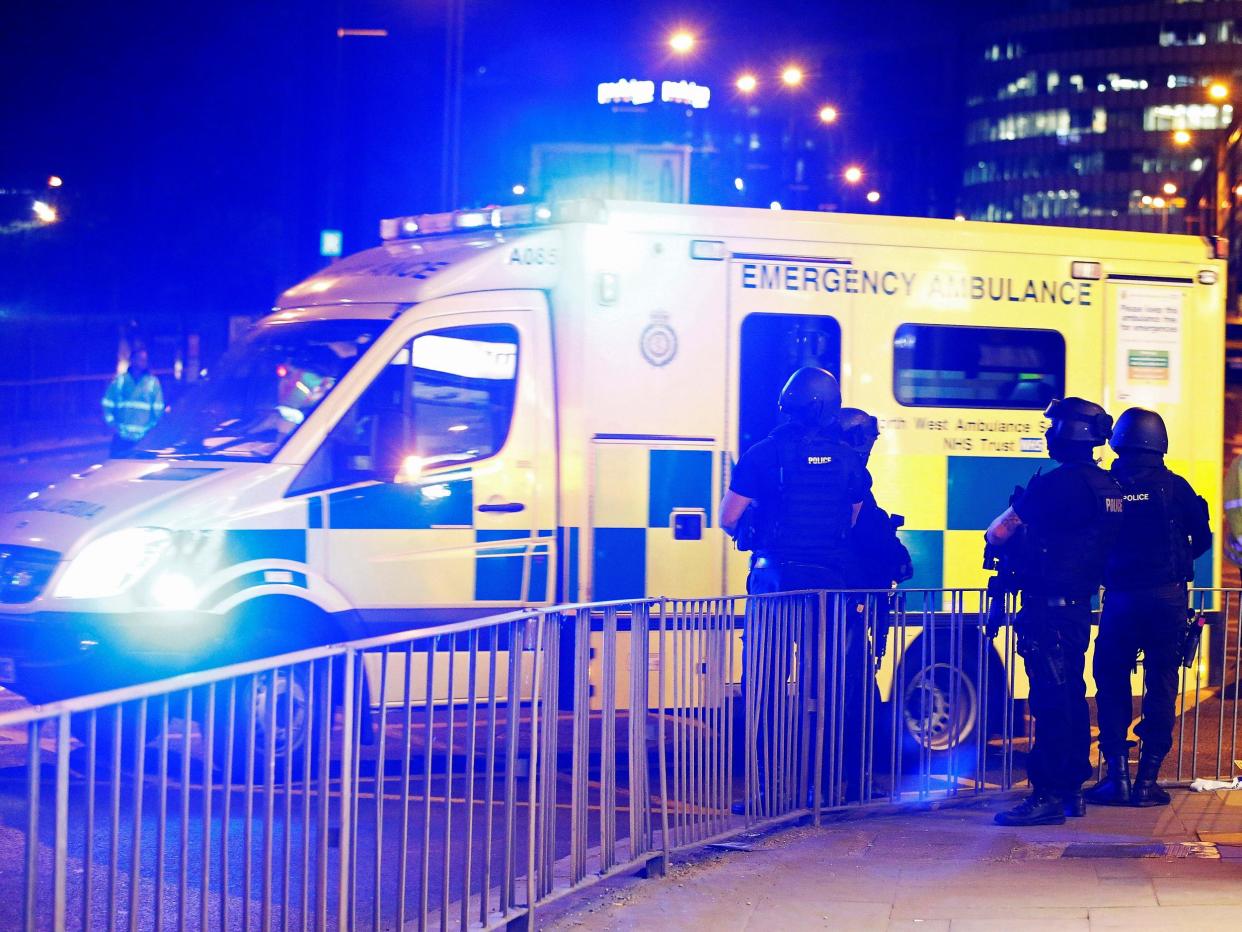Manchester Arena bombing inquiry: ‘I’m going to die, aren’t I?’ victim asked while waiting for treatment

A victim of the Manchester Arena bombing asked a paramedic if he was going to die and was assured he would be saved before losing his life, a public inquiry has heard.
John Atkinson was conscious and talking after the 2017 suicide bombing, and the hearing was told his leg and abdominal injuries were survivable.
The 28-year-old had tried to crawl away from the scene of the blast on his hands and knees and was helped by a member of the public before paramedics arrived.
On Monday, the inquiry into the attack heard he asked a medic: “I'm going to die, aren't I?”
The paramedic responded: “Not on my watch you're not.”
Mr Atkinson was left on the ground for 46 minutes, before being carried on a cardboard advertising hoarding to a casualty clearing station.
The board broke and he dropped from knee height onto a crash barrier, which was also being used to move the injured.
John Cooper QC, who represents 12 of the 22 victims’ families, said the victim was then left for a further 24 minutes “with little done for him” and only taken to hospital 90 minutes after the bombing.
Mr Atkinson, a care worker from Manchester, died from blood loss shortly afterwards.
In an opening statement laying out questions that victims’ families want answered, Mr Cooper asked if he could have been saved and whether he was treated quickly enough.
“The family of John Atkinson would like to know why it is that a venue of the size of Manchester Arena, which can cater for a capacity of over 20,000 people, assisted by emergency services, between them, could only provide John with a cardboard advertisement board and lately a metal queue barrier during his critical moments,” Mr Cooper said.
“It seems that John was untreated for 46 to 47 minutes. Was this crucial to John’s survivability?
"Did the delays in getting him to hospital, exacerbated by the inappropriate and hopelessly, we submit, inadequate method of transporting him count against him in his battle to live?"
The barrister set out a number of issues around the emergency services response to the attack on 22 May 2017.
The first paramedic arrived on the scene in the City Rooms, the foyer of the arena where the bomb exploded, 19 minutes after the blast and was the only one there for the first 40 minutes until two more arrived, the inquiry has heard.
The man who helped Mr Atkinson, Ronald Blake, told the inquiry: “It felt like ages before anybody came to help.”
Mr Cooper questioned the lack of stretchers, medical and security resources at the arena and whether this was due to “penny pinching”.
And although the fire service was notified within three minutes of the bombing, it was two hours before the first firefighters were at the scene, Mr Cooper said.
He cited a terror attack drill carried out a year before that highlighted poor communication and “significant delays” in the response to such an event.
Mr Cooper said the simulation “should have been a wake-up call” but that some organisations had a track record where they “simply do not learn lessons and do not heed warnings”.
The public inquiry, chaired by Sir John Saunders, is also examining how much was known about bomber Salman Abedi before the attack and if it could have been prevented.
A lawyer representing relatives of seven victims said they have grave misgivings about the “obsessive secrecy” of MI5 and the security services, who are giving much of their evidence in closed hearings that families, press and the public cannot attend.
Peter Wetherby QC said much of what is known about Abedi came via the media and not directly from the authorities, and questioned the extent of some restrictions.
He questioned why the name of convicted terrorist Abdalraouf Abdallah, who had been visited by Abedi twice in prison and discussed martyrdom with him, had been redacted in official reports and an MI5 witness statement.
Mr Wetherby said the only people protected by anonymising Abdallah were the security services, adding: “The failure to recognise the association between Abedi and Abdallah was a real missed opportunity.
”The redaction and omission of Abdallah's name from reports and the witness statement is an indication of a lack of transparency by the security services and frankly it calls for a rethink by this inquiry.
“Without the media exposure would there have been an attempt to keep Abdallah's name out of this process?”

The lawyer cited press reports detailing the Abedi's links to extremism, his “radicalised” family and association with terrorists.
Mr Wetherby said victims’ families accepted the need to keep some information of use to terrorists private, but added: “Overbearing secrecy does not protect national security, it does the opposite.
“It protects failure and it prevents progress. It undermines confidence. Justice requires that light is shone into the darkest corners.”
He said confidence in the inquiry from families is high but if MI5 is seen to be treated differently during the inquiry then "confidence will inevitably wane" and findings based on closed hearings could be met with scepticism.
The inquiry previously heard that MI5 had received information on Abedi dating back to 2010, but repeatedly assessed him not to pose a security threat despite knowing of his contact with Isis supporters and travel to Libya.
Paul Greaney QC, counsel to the inquiry, said it would consider whether it was “reasonable” for MI5 to close an active investigation into Abedi in July 2014, and not to reopen it in light of new intelligence. The inquiry will continue on Tuesday.
Additional reporting by PA
Read more


